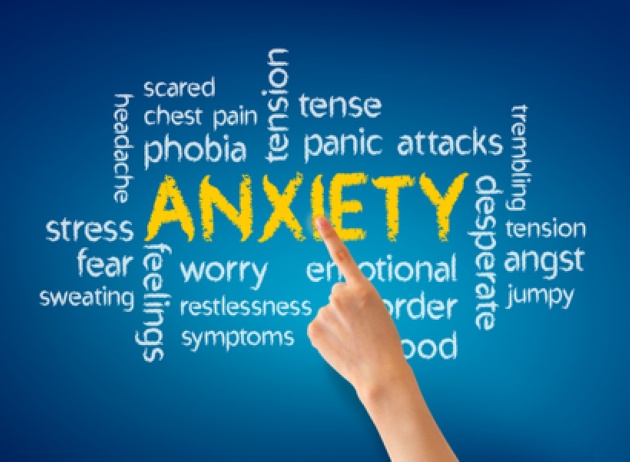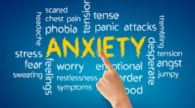Do you consider
yourself a worrier? Do you get nervous more than other people you know? Do you
find yourself avoiding or staying away from places that other people are
usually okay with? Do you feel uncomfortable or fearful around certain
situations? If you answer yes to any of these questions, you may be
experiencing an anxiety disorder.
Anxiety disorders are the most common mental
health problem affecting all ages and communities. Approximately 12<>percentage<> of the
population suffers from anxiety (1 in 10 adults) and some studies have found
that up to 20<>percentage<> of the population has difficulty with anxiety. These statistics
show that if you are struggling with anxiety you are not alone.
Anxiety is a general term for several
disorders that cause nervousness, fear, apprehension, and worry. Most people
will experience some anxiety at different times in their life. For example, it
is normal to feel nervous or tense before a test or presentation, waiting for
medical test results, before a job interview or a first date. In fact, low level
or occasional anxiety can be helpful in focusing out thoughts and mustering
energy. However, in higher bouts, anxiety can be very upsetting and disruptive
to the point, as anxiety sufferers report, it takes the fun out of life.
Anxiety is considered a
problem when symptoms interfere with a person's ability to sleep or otherwise
function. Anxiety disorders affect how we feel and behave which may cause real
physical symptoms. If feeling anxious or nervous causes problems for you at
work, creates difficulties in your family life or social relationships, then
you may be experiencing an anxiety disorder.
The common signs of
anxiety disorders include excessive worry and nervousness, avoidance of places,
situations and/or thoughts. Common physical symptoms include muscle tension, racing
heart, shortness of breath, upset stomach, and dizziness or lightheadedness.
There are six separate
anxiety disorders with specific symptoms that affect adults;
Generalized Anxiety Disorder (GAD) refers to excessive and uncontrollable worry about daily life events and activities.
People experiencing GAD may be considered “worry warts” as they usually feel
they can’t stop the worry and tend to distress even when things are going well.
Various physical symptoms associated with GAD include fatigue, sore muscles,
sleep problems and concentration difficulties.
Social Anxiety Disorder
is one of the most common among these disorders. People with social anxiety
tend to feel quite nervous or uncomfortable in social situations; They suffer persistent, intense, chronic fear of being judged by others and of
being embarrassed
or humiliated
by one's own actions. This fear of embarrassment or rejection
leads to avoidance of social situations and performance type encounters such as
meeting new people, public speaking, or talking in a group. This restraint can
make things worse, severely limiting social and professional lives and often resulting
in isolation and depression.
Specific Phobia is
related to an intense fear of specific situations or things such as needles, dental
appointments, flying, elevators, and spiders, to name a few. When faced with their phobia, individuals will
experience a wide range of emotions from mild to moderate anxiety to very
severe panic or terror, accompanied by unpleasant physical symptoms. Phobias
can interfere in a person’s life making it difficult to participate in social or occupational activities. Most people try to avoid the uncomfortable and often
terrifying feelings associated with their phobia; however, in the long run
avoidance is not the solution because it only makes the fear stronger.
Post
Traumatic Stress Disorder (PTSD) is an anxiety disorder that can develop after
an individual has experienced or witnessed a major trauma. Most people will relive
the traumatic experience through dreams or intrusive thoughts; they may feel
jumpy and edgy, being easily startled. These effects will appear in the first
30 days following a trauma and will lessen with time. For other people,
however, the effects of a trauma will worsen over time or they may occur long
after the trauma. With PTSD, the symptoms are extremely distressing and
individuals attempt to avoid these traumatic memories by avoiding people,
places, and things that seem to trigger the memories. Some individuals are also
likely to cope with their trauma by consuming alcohol, using drugs, gambling
excessively, and getting involved in destructive behavior.
Obsessive
Compulsive Disorder (OCD) is an anxiety disorder that affects about 1 to 2<>percentage<> of
the population. People with OCD experience both obsessions and compulsions. Obsessions are unwanted or disturbing
thoughts related to things such as germs, threats to self or loved ones, or disgusting
mental images that cause anxiety. Compulsions
are deliberate behaviors (washing, checking, ordering things) or mental acts (praying,
counting, repeating phrases) to control or avoid the anxiety caused by the
obsessions. Obsessions and compulsions
are usually very distressing and time-consuming, interfering significantly in a
person’s life.
Panic Disorder involves unexpected
and repeated panic attacks. A
panic attack is a sudden rush of intense fear or discomfort accompanied by symptoms
such as pounding heart, sweating, trembling, shortness of breath, chest pain, chills
or hot flashes, upset stomach, dizziness or lightheadedness, a sense of things
being unreal or feeling detached from oneself, numbness or tingling sensations,
fear of losing control or "going crazy", fear of dying and desire to
escape. Having a panic attack does not mean you have panic disorder. Panic
attacks are common and may occur if you are feeling very stressed and/or,
overtired, or if you have been exercising
excessively. With
panic disorder, panic attacks are unexpected and reoccurring, leading to a fear
of panic attacks and the belief that something bad will happen because of a
panic attack (such as going crazy, losing control, or dying). Individuals
with panic disorder will often change their behavior to feel safer and prevent
future panic attacks, often finding themselves avoiding more and more
situations until they are avoiding almost everything. This avoidance limits a
person’s ability to live life in a normal manner.
Anxiety
disorders are highly treatable. Psychological
counseling and medications, and sometimes a combination of the two, have shown
to be very effective in treating anxiety disorders. If you think you or a
family member may have an anxiety disorder, you can contact you family doctor
or mental health professional. There are many things you can do on your own to
reduce anxiety symptoms and prevent anxiety disorders. These self-help
strategies will be explained in future articles that focus on anxiety across
the lifespan beginning with children and youth, and then focusing on adults and
elderly individuals.
For more information on anxiety disorders visit
www.anxietycanada.ca.

 In The Latest Issue:Latest Issue:
In The Latest Issue:Latest Issue:
- A Bittersweet Farewell
- The new Laval Aquatic Co...
- The End of an Era:
Articles
Calendar
Virtual- ANNUAL TEACHER APPRECIATION CONTEST
- APPUI LAVAL
- ARTS & CULTURE
- CAMPS
- CAR GUIDE
- CCIL
- CENTENNIAL ACADEMY
- CHARITY FUNDRAISING
- CITYTV
- COSMODÔME
- COMMUNITY CONNECTIONS
- COVER STORY
- DINA DIMITRATOS
- ÉCOLE SUPÉRIEURE DE BALLET DU QUÉBEC
- EDITORIALS
- ÉDUCALOI
- EDUCATION
- EMPLOYMENT & ENTREPRENEURSHIP
- FÊTE DE LA FAMILLE
- FÊTE DU QUARTIER SAINT-BRUNO
- FAMILIES
- FESTIVAL LAVAL LAUGHS
- FÊTE DE QUARTIER VAL-DES-BRISES
- FINANCES
- GLI CUMBARE
- GROUPE RENO-EXPERT
- HEALTH & WELL-BEING
- 30 MINUTE HIT
- ANXIETY
- CHILDREN`S HEALTH & WELLNESS
- CLOSE AID
- DENTAL WELLNESS
- EXTREME EVOLUTION SPORTS CENTRE
- FONDATION CITÉ DE LA SANTÉ
- GENERAL
- HEARING HEALTH
- MESSAGES FROM THE HEALTH AGENCY OF CANADA
- MENTAL HEALTH
- SEXUALITY
- SOCIAL INTEGRATION
- SPECIAL NEEDS
- TEENS
- THE NUTRITION CORNER
- THE NUTRITION CORNER - RECIPES
- VACATION DESTINATION
- WOMEN'S FITNESS
- WOMEN'S HEALTH
- HILTON MONTREAL/LAVAL
- HOME & GARDEN
- INTERNATIONAL WOMEN'S DAY
- JAGUAR LAVAL
- LAVAL À VÉLO
- LAVAL FAMILIES TV SHOW
- LAVAL FAMILIES MAGAZINE CARES
- LAVAL URBAN IN NATURE
- LE PARCOURS DES HÉROS
- LES PETITS GOURMETS DANS MA COUR
- LEON'S FURNITURE
- LEONARDO DA VINCI CENTRE
- LFM PREMIERES
- LIFE BALANCE
- M.P. PROFILE
- MISS EDGAR'S AND MISS CRAMP'S SCHOOL
- MISSING CHILDREN'S NETWORK
- NETFOLIE
- NORTH STAR ACADEMY LAVAL
- OUTFRONT MEDIA
- PASSION SOCCER
- PARC DE LA RIVIÈRE-DES-MILLE-ÎLES
- PÂTISSERIE ST-MARTIN
- PIZZERIA LÌOLÀ
- PLACE BELL
- PORTRAITS OF YOUR MNA'S
- ROCKET DE LAVAL
- SACRED HEART SCHOOL
- SCOTIA BANK
- SHERATON LAVAL HOTEL
- SOCIÉTÉ ALZHEIMER LAVAL
- STATION 55
- STL
- SUBARU DE LAVAL
- TECHNOLOGY
- TEDXLAVAL
- TODAY`S LAURENTIANS AND LANAUDIÈRE
- TODAY`S LAVAL
- WARNER MUSIC
- THIS ISSUE
- MOST RECENT
Magazine
The Basics about Anxiety Disorders
Articles ~e 105,7 Rythme FM 4 chemins Annual Teacher Appreciation Contest Appui Laval Arts & Culture Ballet Eddy Toussaint Camps THIS ISSUE MORE...
CONTESTS Enter our contests
CONTESTS Enter our contests
CALENDAR
Events & Activities
COMMUNITY Posts Events
PUBLICATIONS Our Magazine Family Resource Directory
LFM BUSINESS NETWORK Learn more
COUPONS Click to save!
COMMUNITY Posts Events
PUBLICATIONS Our Magazine Family Resource Directory
LFM BUSINESS NETWORK Learn more
COUPONS Click to save!
SUBSCRIPTIONS
Subscribe to the magazine
Un-Subscribe
E-NEWSLETTER Subscribe to our E-newsletter Un-Subscribe
WRITE FOR US Guidelines & Submissions
POLLS Vote today!
E-NEWSLETTER Subscribe to our E-newsletter Un-Subscribe
WRITE FOR US Guidelines & Submissions
POLLS Vote today!
ADVERTISERS
How to & Media guide
Pay your LFM invoice
SUGGESTIONS Reader's Survey Suggest a Listing
LFM About Us Our Mission Giving Back Contact Us
SUGGESTIONS Reader's Survey Suggest a Listing
LFM About Us Our Mission Giving Back Contact Us
 PICK-UP LOCATIONS
Get a copy of LFM!
PICK-UP LOCATIONS
Get a copy of LFM!
TERMS & CONDITIONS Privacy | Terms
ISSN (ONLINE) 2291-1677
ISSN (PRINT) 2291-1677
Website by ZENxDESIGN



 BY:
BY: 
Tweet
Share